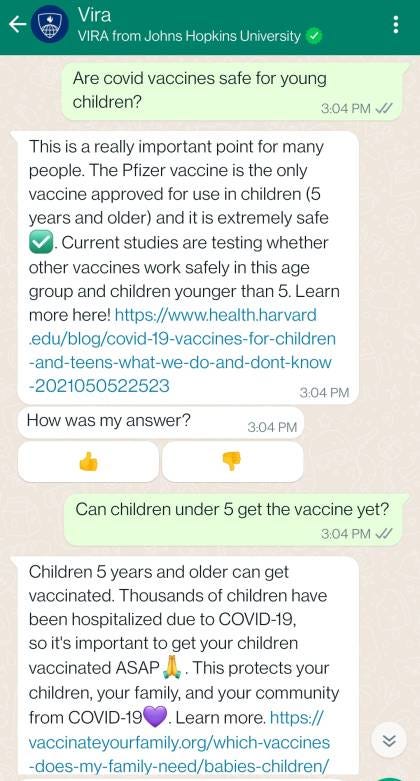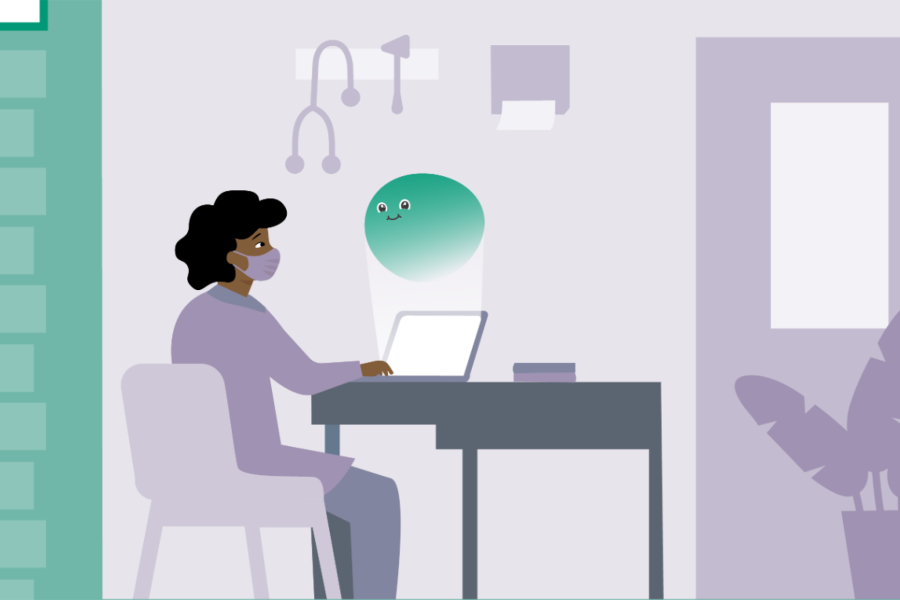Researchers at Johns Hopkins had already been developing chatbots to combat vaccine misinformation when the coronavirus pandemic arrived, giving their work greater urgency
Johns Hopkins University — HUB
Katie Pearce
Mar 24, 2022
Even before the COVID-19 pandemic, researchers at Johns Hopkins were looking for ways to tackle a growing sense of public distrust in vaccines. The measles outbreaks of 2018-with thousands dying of a vaccine-preventable disease-underscored that need.
In many parts of the globe, the problem of lower vaccine uptake has stemmed from a lack of access to certain vaccines, says Rose Weeks, a research associate with the Johns Hopkins International Vaccine Access Center, part of the Bloomberg School of Public Health.
In others, like the U.S., social media and other sources have fanned doubts and misinformation.
“We were thinking about how to intervene,” Weeks says. “But also, how do we get a better sense of what people are seeing and thinking in some of these closed channels?”
An approach that seemed promising was to leverage the power of artificial intelligence-and more specifically, chatbots.
Over the past few years, as automated conversational software has become a routine part of many customer-service experiences, its use in public health has also expanded.
Chatbots now exist to help with diabetes, depression, breastfeeding, weight control, and smoking cessation, among many other health issues.
Over the past few years, as automated conversational software has become a routine part of many customer-service experiences, its use in public health has also expanded.
Chatbots now exist to help with diabetes, depression, breastfeeding, weight control, and smoking cessation, among many other health issues.
In 2019 João Sedoc, associate professor of computer science, helped connect his colleagues at Hopkins with the groundbreaking IBM Research team that developed “Project Debater,” the first A.I. system to take on complex debates with humans.
“We wanted to take that debate technology and move it into the public health sphere,” says Sedoc, who specializes in machine learning and natural language processing.
He has since joined New York University’s Stern School of Business in addition to retaining his adjunct position at Hopkins.

The Vaccine Information Resource Assistant debuted on WhatsApp this past January and can help answer questions about COVID-19 vaccines and share reputable resources for further information.
IMAGE CREDIT: VACCINE INFORMATION RESOURCE ASSISTANT
The IBM team offered pro-bono support for building a new chatbot with experts from the Johns Hopkins Whiting School of Engineering and Naor Bar-Zeev, an associate professor of international health at Hopkins who focuses on vaccine access and equity.
During the development process, COVID-19 arrived and priorities shifted. “When the pandemic happened, we realized it was an opportunity to try this technology right now,” Sedoc says.
As COVID-19 vaccines were still racing through clinical trials, the team developed VIRA, the Vaccine Information Resource Assistant.
The chatbot debuted first as a webpage in July 2021, and later, with the marketing and technical support of Meta (previously Facebook), as a WhatsApp version this past January.
The app is currently available in the U.S. in both English and Spanish, and the team is building international models.
The app is currently available in the U.S. in both English and Spanish, and the team is building international models
Responding immediately to user questions, VIRA offers concise, plainspoken, expert-vetted answers to questions about COVID-19 vaccines, linking to trusted sources for further information.
Responding immediately to user questions, VIRA offers concise, plainspoken, expert-vetted answers to questions about COVID-19 vaccines, linking to trusted sources for further information.
VIRA is among a wave of chatbots born during COVID-19, a phase of accelerated growth for the technology.
At the start of the pandemic, the World Health Organization offered a chatbot to battle misinformation on social media, and the U.S. Centers for Disease Control and Prevention introduced “Clara,” a coronavirus self-checker.
In June 2020, one report found that a majority of U.S. states-drowning in calls to government agencies-were developing chatbots to provide COVID-19 information.
The VIRA chatbot stands out not only for its specific focus on vaccines but also its adaptability.
The team has learned as they’ve gone along, making updates based on user input and evolving science.
“It’s not enough to disseminate knowledge-we’re not the end-all, be-all of knowledge,” Bar-Zeev says of public health experts. “We have to listen as well. It’s a two-way street.”
The VIRA chatbot stands out not only for its specific focus on vaccines but also its adaptability.
The kinds of questions VIRA users ask have changed over time. Initially, many wanted to know about the general side effects and safety of vaccines, but recently users are asking about post-infection immunity, booster shots, and issues surrounding vaccines and children.
The VIRA team has expanded its original list of 30 or so key topics to nearly 200.
The kinds of questions VIRA users ask have changed over time. …
The VIRA team has expanded its original list of 30 or so key topics to nearly 200.
“Concerns do change with the evidence and science and headlines,” Bar-Zeev says. “You know, the pandemic continues to surprise.”
The tool can offer anonymity for questions on sensitive topics-such as the vaccine’s effects on fertility, menstrual cycles, and sexual function-or even for asking any questions at all.
In a climate where vaccines are a polarizing issue, chatbots may offer nervous individuals the shelter to explore topics they might not be comfortable discussing with another person.
“Anybody who asks a question or shows hesitation can be discredited as an anti-vaxxer,” Bar-Zeev says. “But I think that’s a big mistake.”
The tool can offer anonymity for questions on sensitive topics-such as the vaccine’s effects on fertility, menstrual cycles, and sexual function-or even for asking any questions at all.
While the VIRA team originally envisioned their target user as a young person hesitant about vaccines and already comfortable with chatbots, they’ve seen a variety of uses.
Some ask questions on behalf of loved ones-an older parent or a young child, for example.
Weeks says community health workers, contact tracers, and others in public health outreach have also found the chatbot valuable for work in the field.
Several organizations have now embedded VIRA into their webpages, including BMoreVaxxed and Voices on Vax in Baltimore, the Made to Save campaign, and the Immunize Kansas Coalition.
Several organizations have now embedded VIRA into their webpages, …
In the future, the VIRA team aims to make the chatbot a more global tool, and is currently in talks with health agencies in India and Zambia, according to Weeks.
The VIRA team sees potential for this technology to address public health issues beyond COVID-19.
And as chatbots become more common in the field, they envision more sophisticated versions handling multiple topics at once.
The VIRA team sees potential for this technology to address public health issues beyond COVID-19.
The technology isn’t quite there yet, Sedoc acknowledges. “I think chatbots have come a long way in public health area, but have a ways to go,” he says.
Still, there’s no shortage of inspiration for what future iterations of the tool might look like.
“At the moment, chatbots aren’t really being used the most widely or effectively in public health, while we’re seeing so many other places-insurance companies, banks, every company under the sun-utilize them,” Weeks says.
“We should probably be taking more advantage of this technology that’s available.”
Originally published at https://hub.jhu.edu on March 24, 2022.
Names mentioned
João Sedoc, associate professor of computer science
IBM research team
Naor Bar-Zeev, an associate professor of international health at Hopkins












